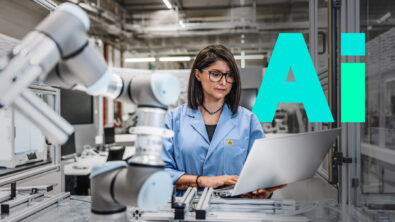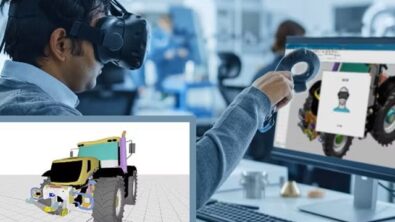Automating industrial AI model deployment

Data is transforming the manufacturing industry with applications ranging from real-time performance monitoring of machines and equipment to optimized planning of workforces, tasks, and production configurations. Many of these applications leverage AI/ML to turn the ever-increasing volume of data streaming off production equipment into key insights that drive value for factories. One of the main challenges to scaling industrial AI use cases within factories is standardization on tools and services, proper operational concepts, and answers to IT security requirements.
Security from cloud to edge
Much of the development process for AI and ML tools takes place in the cloud which provides developers with flexible access to tools, large datasets, and training hardware enabling rapid development cycles. In contrast to development, deployment and inferencing often needs to take place on the edge — the operational technology (OT) system of the shopfloor where the data is generated. For example, when it is not economical to transfer the large quantities of data generated at the shop floor to the cloud or when latency is a key concern.
Due to the sensitive nature of OT systems, cloud-to-edge deployment can be challenging since OT requires specialized hardware devices, as well as strict network protection and security policies. Compared to IT systems OT system also have a much stricter control over the flow of data. Consequently, using ML on the edge with frequent model retraining to account for changing shopfloor parameters requires structured, secure, and automated deployment mechanisms from cloud to edge.
Building a robust pipeline
To address these challenges, hardware like Siemens Industrial Edge offered jointly with software partners such as AWS can create a secure cloud to edge pipeline that ensures models are deployed without any tampering inflight without compromising OT security. This is handled through 3 main components: Siemens AI SDK, Siemens AI Model Manager (AI MM) and Siemens AI Inference Server (AI IS).
The first step happens in the cloud with the AI SDK. After a model is created by a data scientist in the cloud on Amazon SageMaker and stored in the SageMaker model registry, this SDK allows users to package a model in a format suitable for edge deployment using Siemens Industrial Edge. This ensures the model is complete and ready to deploy when it reaches its final destination.
The second component, and the central connection between cloud and edge, is the AI Model Manger running on factory IT network level. This system is part of the intermediate IT system and acts as the deployment tool for models to one or multiple virtual or physical Siemens Industrial Edge Devices (IED) and provides a secure communication interface to external services. In addition, the AI Model Monitor, deployed alongside the Model Manager, acts as a collector for inference feedback and logs to ensure robustness of the deployed model and allow for continued fine-tuning.
The third component is the Siemens AI Inference Server (AIIS), a specialized and hardened AI runtime environment running as a container on Siemens IEDs deployed on the. The AIIS receives the packaged model from AI MM and is responsible to load and execute pipelines close to the production lines. This allows models, created in the cloud, to run securely and as expected on local hardware without compromising the OT infrastructure of the factory they’re deployed in.
With a robust end-to-end architecture in place, automation engineering can take over the AI solution. The Siemens Industrial AI applications are designed to be user friendly, allowing automation engineers with no prior data science experience to easily deploy, run, and monitor AI solutions.
Bringing AI into the factory is vital for the future of smart manufacturing but ensuring these models, from development to deployment, remain secure and achieve the required level of robustness for OT applications is equally important. This is why developing key partnerships between companies on the forefront of smart manufacturing like Siemens, and those leading the way in cloud AI development is one of the most important steps to realizing the next generation of smart manufacturing.
Siemens Digital Industries Software helps organizations of all sizes digitally transform using software, hardware and services from the Siemens Xcelerator business platform. Siemens’ software and the comprehensive digital twin enable companies to optimize their design, engineering and manufacturing processes to turn today’s ideas into the sustainable products of the future. From chips to entire systems, from product to process, across all industries. Siemens Digital Industries Software – Accelerating transformation.


